Marcia Thornton Jones's Blog, page 22
March 8, 2024
REBOUND -- by Jane Kelley
The treasures of the Morgan Library in New York City always inspire me. When I visited there a few weeks ago, one of Mark Twain's notes to himself caught my eye.
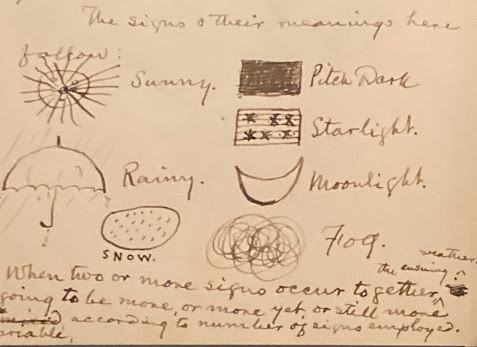 As you see, he created symbols for the weather to save himself the trouble of writing out the descriptions. Aha, I thought. I could do this too! (I confess I'm a reluctant describer. )
As you see, he created symbols for the weather to save himself the trouble of writing out the descriptions. Aha, I thought. I could do this too! (I confess I'm a reluctant describer. )  According to the plaque, Twain had a good reason to be in a hurry to finish the novel he was writing. He was broke. This doesn't seem that extraordinary for most writers. But Twain had made a lot of money! What happened? Was he a spendthrift? No. He made unbelievably bad investments. Including starting his own publishing house, which he eventually described as "lingering suicide."
According to the plaque, Twain had a good reason to be in a hurry to finish the novel he was writing. He was broke. This doesn't seem that extraordinary for most writers. But Twain had made a lot of money! What happened? Was he a spendthrift? No. He made unbelievably bad investments. Including starting his own publishing house, which he eventually described as "lingering suicide."Did he learn? No. He kept sinking money into unwise investments again and again.
He wasn't dumb. And yet, as Dan Piepenbring wrote about him in the New Yorker, "He, too, was drawn in by more than his fair share ofcure-alls, gadgets, swindles, and flimflam artists." It was the Gilded Age. There were plenty of those kinds of characters around. Twain made the money he would eventually lose by writing about them. Which brings me to the theme for this month. Rebound.
In Twain's life and in his literature, he kept trying something crazy, failing at it, laughing about it, describing it in such a way that his readers could laugh about it. And eventually moving on.
There is a sucker born every minute. But as Twain knew, there's also a story born. Who better to write about it than Twain. Even if he preferred to draw a little picture of a umbrella instead of describing the rain.
That's how he wrote 60,000 words IN ONE MONTH.
It's taken me three years to write 30,000. And I haven't been describing the weather either.
JANE KELLEY is the author of many middle-grade novels. Her father was an inventor of several products including the Bait Palace, a styrofoam box whose design made it easy to retrieve worms who hide at the bottom of the container. Mark Twain would have probably invested a lot of money in that.
@font-face {font-family:"Cambria Math"; panose-1:2 4 5 3 5 4 6 3 2 4; mso-font-charset:0; mso-generic-font-family:roman; mso-font-pitch:variable; mso-font-signature:-536870145 1107305727 0 0 415 0;}@font-face {font-family:Aptos; panose-1:2 11 0 4 2 2 2 2 2 4; mso-font-charset:0; mso-generic-font-family:swiss; mso-font-pitch:variable; mso-font-signature:536871559 3 0 0 415 0;}p.MsoNormal, li.MsoNormal, div.MsoNormal {mso-style-unhide:no; mso-style-qformat:yes; mso-style-parent:""; margin:0cm; mso-pagination:widow-orphan; font-size:12.0pt; font-family:"Aptos",sans-serif; mso-ascii-font-family:Aptos; mso-ascii-theme-font:minor-latin; mso-fareast-font-family:Aptos; mso-fareast-theme-font:minor-latin; mso-hansi-font-family:Aptos; mso-hansi-theme-font:minor-latin; mso-bidi-font-family:"Times New Roman"; mso-bidi-theme-font:minor-bidi;}.MsoChpDefault {mso-style-type:export-only; mso-default-props:yes; mso-ascii-font-family:Aptos; mso-ascii-theme-font:minor-latin; mso-fareast-font-family:Aptos; mso-fareast-theme-font:minor-latin; mso-hansi-font-family:Aptos; mso-hansi-theme-font:minor-latin; mso-bidi-font-family:"Times New Roman"; mso-bidi-theme-font:minor-bidi; mso-font-kerning:0pt; mso-ligatures:none;}div.WordSection1 {page:WordSection1;}
March 4, 2024
EVERYTHING COMES FROM MOTHER EARTH (Guest Post by Susan B. Wile)

I have always loved animals and I am awed by the natural world and the extraordinary diversity of animals and plants with whom we share our planet. Evolution and extinction hold great interest for me too, and I am fascinated by indigenous people who honor, respect, and live in harmony with nature and have a deep knowing that everything comes from Mother Earth. Technology intrigues me as well and the many promises it holds for the future.
After more than ten years writing a story that combines these passions and interests, I published my first novel last fall. EXTINCTION WARRIOR is a middle grade/YA environmental science fantasy set in 2155 about a young, clairvoyant animal communicator who grows up on the Bering Strait in a tiny indigenous community, the westernmost place on the North American mainland - Wales, Alaska. It’s a real place and the chokepoint for the annual marine migration. When her parents disappear pursuing a notorious animal trafficker, my fearful protagonist and an android go on a quest to find them. They collect endangered animals as bait and masquerade as traffickers to lure the leader of the trafficking gang. The story features Arctic culture, diverse environments and world geography, climate change, endangered animals, the sixth extinction and A.I.
As a writer, I’m a “pantser.” I didn’t outline EXTINCTION WARRIOR and as I wrote and researched steadily over the years, I thought I was letting the story take me where it wanted to go. But my passion to weave a tale about protecting Mother Earth pushed the story in a direction that didn’t work. Fortunately, the developmental editor I hired helped me see where the story wanted and needed to go and following a major revision, I took the steps to self-publish.
These are pivotal times. Having degraded and polluted Mother Earth while rapaciously exploiting Her resources, we face the profound consequences of our species’ impact on the planet and must act.
The current extinction rate is 10,000 times higher than the natural, historical rate. More than one in four species faces extinction. Unless urgent action is taken, the rate is predicted to rise to 50% by 2100. Will we be able to stop or even reverse it?
With our energy consumption and overcrowding Stephen Hawking theorized that humans would turn the earth into a giant ball of fire, which will make earth uninhabitable and that we would face extinction or need to colonize another planet. Could humanity embrace zero population growth?
Last year the average global temperature exceeded 1.5 degrees Celsius for the entire year. Each of us can help reverse climate change by eating less meat, to use it as a condiment instead of a main protein. Will we wake up to the power we wield at the end of our forks? Can we make the cultural shift and embrace crickets as an environmentally friendly protein? My protagonist does. Can we finally wean ourselves off big oil? Might scientists unlock fusion technology in time to mitigate global warming?
We are living during an unofficial epoch known as the Anthropocene. It is the most recent period in Earth’s history when human activity started to have a significant impact on the planet’s climate and ecosystems. What markers will delineate this era? Does it begin with the geochemical traces of nuclear bomb tests, specifically plutonium cored from the bed of a lake in Ontario, Canada? Does it end with every square inch of earth, from the highest mountains to the deepest oceans containing particles of plastic?
At the heart of being human is our ability to communicate and cooperate, but the cement that binds cooperation and kindness is empathy. Nevertheless, our lizard brain continues to have the upper hand. We are territorial and competitive in the extreme - hunger, thirst, and sex are our drivers.
For years I have joked that I want aliens to come down and bitch-slap humanity into higher consciousness, but I’m not joking anymore. I would love that to happen! POOF. Our awareness expands into a state of permanent nonduality. No more lizard brain. War and competition for resources instantly vanish and we know we are one, just as John Lennon wrote in The Walrus, “I am he, as you are he, as you are me and we are all together.”
EXTINCTION WARRIOR is a hopeful story with a happy ending. Facing challenges and setbacks, my protagonist overcomes her fears and anxieties. By taking action, she and the android succeed in their search, bring the trafficker to justice, save the last pangolins on earth, and with the help of her pet arctic fox, my heroine rescues her parents too. I am hopeful for our planet because Mother Earth is amazingly resilient. Like my protagonist we must overcome our fears and anxieties and act. We can begin simply by choosing what we put on our forks.
~
Order a copy of Extinction Warrior and keep up with Susan B. Wile at her author site.
March 3, 2024
For Writers: How to Rebound from Rejection
 Irene Latham, still writing,
Irene Latham, still writing,in spite of it all While the author-journey sometimes yields Mt. Everest-type vistas, it's also pocked with valleys of despair, swamps of hopelessness and desolation.
I've experienced many a day when I've wanted to unlace my hiking boots and call in the rescue team. When I've wanted to quit, when I HAVE quit.
But here's the thing: There is only one way to fail as a writer, and that is to stop writing.
I'm here to tell you: DON'T STOP.
Or rather, stop, but only for a little while.
Consider this your short tutorial on how to rebound from rejection from a writer who has been walking the path—and going off the trail— for quite a while now. I've had some marvelous successes! And SO. MANY. HEARTBREAKS.
Here's how to rebound from rejection:
Sit with it. I get really irritated when I've just gotten a rejection, and someone oh so cheerily tells me it's no big deal, just part of it, blah blah blah. It IS a big deal. Time to acknowledge that you really wanted this YES, whatever it was. That you're disappointed. No need to put on a brave face. Just own your feelings.
Relax. By which I mean, step away from your writing. Read, meditate, walk, kayak, do pilates. . . or whatever gets your body moving.
Connect with your tribe. The best way to get perspective after a crushing disappointment is to remember this is not a singular experience. All writer experience rejection. You are not alone.
Reframe. Ask yourself what the message is. What can be learned? What adjustments need to be made?
Remember: If it didn't work out, it just wasn't meant for you at this time. Something else is waiting for you. It's up to you to show up and be available to accept whatever that thing is.
Also remember: your words are important. The world needs your stories. You are the only one with your particular truth. You must carry on. You've been given a gift – the love of the written word, the patience and wonder it takes to create poems and stories – share it with the world. Love yourself enough to resist judgment and comparisons and envy and those other wastes of energy. Write like the world is on fire, and it's your job to save it. Write like you're an alien visiting from another planet. Write like your heart will stop beating if you don't. And someday, when you get that YES, celebrate the NO's that got you there.
Above all: KEEP GOING. xo
---
Want more insight, inspiration & imagination? SIGN UP FOR MY "ADVENTURES IN WRITING" NEWSLETTER!
March 2, 2024
Rebounding with Some Middle Grade Reading for March!
With spring on the horizon, I thought it was time for some middle grade reading recommendations. On my blog Book Q&As with Deborah Kalb, I recently interviewed a trio of authors with new MG novels.
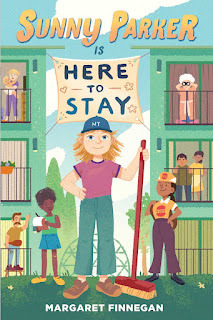
Margaret Finnegan is the author of the forthcoming novel Sunny Parker Is Here to Stay, which is based partly on her own experiences living in affordable housing. When I asked Finnegan what she hoped readers took away from the story, she said, "I always hope that readers finish my books feeling happy, like they’ve had achance to laugh and relax. But I also hope they’ve enjoying stepping intosomeone else’s shoes," adding, "That’sthe amazing thing about novels, right? They let us experience lives differentfrom our own, and, in doing so, gain empathy and understanding."
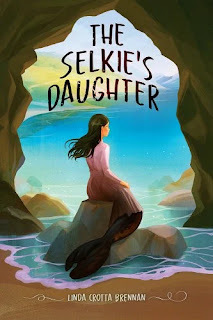
Linda Crotta Brennan's new novel is The Selkie's Daughter. When I asked her how she created her protagonist, Brigit, she said, "Brigit inspired me to write The Selkie’s Daughter.One morning she strode onto the page of my journal. She was standing on a cliffhurling a prayer over the raging sea, 'Bring him home, bring him home, bringhim home.'" She added, "Who was she? Who was 'he' and what had happened tohim? I journaled further to discover the answers, finding them on themist-shrouded coast of Cape Breton in Nova Scotia and its storied Celtictraditions. Brigit’s father was a fisherman, lost at sea, and hermother…well her mother was a selkie, a seal woman, a secret Brigit must keepfrom her suspicious neighbors."
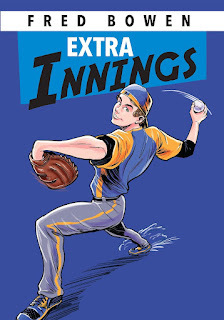
Fred Bowen is the author of the new novel Extra Innings. He said of creating his main character Mike McGinn, an aspiring baseball pitcher, "I remember when my son was around 14 years old. He was too old for summer campsbut too young for a job. He was at loose ends most of the summer, doing oddjobs around the house. But Liam loved baseball and that gave his summer somepurpose and structure." He added, "Iwas remembering that summer when I came up with the character Mike. He is 14years old and is enjoying his last summer without a job. But he is working hardto become a better pitcher."
Happy reading!
--Deborah Kalb
February 28, 2024
When You Don't Want to Hear a Thing (Holly Schindler)
Sometimes, I feel like I'm especially sensitive to noise. I can't write to music. I never have been able to. I can sometimes do illustration work to it. I can draw and draft writing projects to talking (the TV can be on). But if I'm trying to be hyper-focused on revising or tightening my manuscripts, I want to get completely away from any verbal noise at all. Which is how I wind up spending so much time outdoors writing.
The only noise that I've ever found that helps me work is white noise.

A quick Google search will lead you down a bit of a rabbit hole on the subject. I'm not the only one who thinks white noise increases focus. There's just something about a constant, repetitive noise that helps keep my mind from wandering. Part of it, I'm sure, is that it drowns out the other noises. But it's more than that. I have more sustained writing sprints. I don't tire out mentally as quickly.
There are ton of apps out there with white noise options. If you give it a shot, my personal favorite sound to write to is rain on a tent. I hope it help you, as well.
~
Holly Schindler is the author of the MG The Junction of Sunshine and Lucky
February 27, 2024
Shhh! Do You Hear That?
By Charlotte Bennardo
Sound is one of the senses most used in writing. Authors talk about the waves crashing, angry shouts, doors slamming.
 Photo by Emiliano Arano: https://www.pexels.com/photo/ocean-wa...
Photo by Emiliano Arano: https://www.pexels.com/photo/ocean-wa...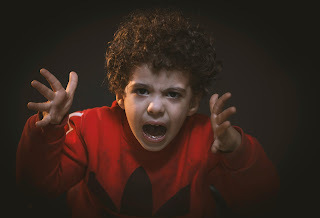 Photo by mohamed abdelghaffar: https://www.pexels.com/photo/toddler-...
Photo by mohamed abdelghaffar: https://www.pexels.com/photo/toddler-... Photo by Adrienn: https://www.pexels.com/photo/photo-of...
Photo by Adrienn: https://www.pexels.com/photo/photo-of...For most of us, we are surrounded by sound, and we authors try to incorporate them into our writing. To not include sounds makes the writing thin, we feel something's missing. Think about a specific moment of your day; let's say 10 p.m. Everyone's in bed, sleeping- but there are still sounds: your partner's breathing (or snoring, let's be real), the bed squeaking as you turn over, truck downshifting on a road somewhere, the heat or A/C turning on... Even silence is an acknowledgement to sound. Think about a good horror or psychological thriller, when no outside noise is heard, but there is the rush of blood in our ears, the soft sigh of our breath as we listen, searching for THE sound we most dread: the creak of a stair, the soft foot fall of a stalker.
Unfortunately, describing those sounds leads to one of the most frustrating aspects authors face when writing: telling vs. showing. Consider:
I heard her sigh softly in the dimness.
That's TELLING.
Here's SHOWING:
She sighed softly in the dimness.
(Same logic applies to numerous other words, but I digress. That's a subject for another post.)
Sound should be well represented so that the reader is HEARING them in their mind, not just acknowledging them, as shown in the telling example. And, if written well, readers will be LISTENING for sounds in the story, such as during a crime drama, there should be wails of police sirens, or during a shootout scene, the bang of bullets and the whine of a ricochet, or during a scene at a playground, the yells, calls, and shouts of children playing and arguing over game rules. There is no complete picture without sounds.
Ideally, all the senses should be well represented, although 'taste' can't be an equal unless it's a culinary story.
So when we write, we need to LISTEN for the sounds that surround us, and not only are part of the story, but enhance it.
 Photo by Andrea Piacquadio: https://www.pexels.com/photo/man-in-r...
Photo by Andrea Piacquadio: https://www.pexels.com/photo/man-in-r...Charlotte writes MG, YA, NA, and adult novels in sci fi, fantasy, contemporary, and paranormal genres. She is the author of the award-winning middle grade Evolution Revolution trilogy, Simple Machines, Simple Plans, and Simple Lessons. She co-authored the YA novels Blonde OPS, Sirenz, and Sirenz Back in Fashion. She has two short stories in the Beware the Little White Rabbit (Alice through the Wormhole) and Scare Me to Sleep (Faces in the Wood) anthologies. Having finished her MFA, she's applying what she learned and is working on several children's and adult novels, along with some short stories. She lives in NJ with her family and her floofy cat. When they trimmed the backyard tree, the crazy squirrel couple had to move out.
February 15, 2024
The Art of Listening: Podcasts That Inspire
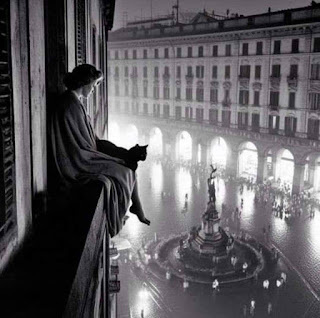
Victor Hugo reminds us (Eviradnus, 1922) reminds us,
"And exclaim, by fancy stirred,
'Hero and Leanderthey;
We in listening for aword,
Let our water fallaway.' “
As we at Smack Dab continue to ponder what it means tolisten for a word, I offer these podcasts that you might find inspiring. I use these in my classes.
These eleven shorts (and free!), inspiring videos are on TEDTalks: Isabel Allende speaks on the passion in your writing. Pico Iyer ponderson the meaning of home. Chimamanda Adiche talks about finding the authenticvoice. Amy Tan dives deep into the creative process. Karen Thompson Walkershows how fear propels fiction. And many more, here.
Literary agent Sarah Fisk – also known under the pen name asYA author Sarah Nicholas – sponsors several podcasts and videos that take adeep dive into craft concepts. Included is a list of upcoming Live Streampodcasts you might find particularly helpful. Take a listen here.
Journalist Hattie Crisell interviews several authors,screenwriters, poets and more, to gain invaluableinsights into their writing habits, motivations, and unique approaches. Take a listen here.
Book Riot offers fresh insights into the coolest and mostrelevant topics in the literary world. Take a listen here.
Joanna Penn and her Creative Penn explores the necessaryknowledge to successfully navigate the ever-evolving publishing world. Take a listen here.
One of my favorites, K.M. Weiland offers a guide to craftingcompelling characters and polished prose. Take a listen here.
Manuscript Academy (MSWL) offers very enlightening dialogueswith agents, editors, and writers on how to navigate the challenges in yourpublishing journey. Take a listen here.
Kelton Reid of The Writer Files studies renowned writers'habits and shares secrets of productivity and creativity to keep the wordsflowing. Listen here.
Finally Alexa Donne is a traditionally published YA authoroffers crafting advice, publishing Real Talk, drafting and editing vlogs,interviews with authors, book reviews & more. Her video on narration vs dramatization (showvs tell) is a must see. See her full playlist here.
Thank you for listening!
-- Bobbi Miller
February 12, 2024
Do You Listen? Do You Hear? by Darlene Beck Jacobson
This month's theme of listening gives me a lot of food for thought. As an author trying to create authentic characters and settings, it is imperative to listen. Listening not only to the words our characters say or the sounds we hear with our ears.
I'm talking about listening to the movements and feelings that course through our own bodies. Telling us what we need, be it food, drink, movement, or rest. Listening to what that food we just ate is saying. Good taste? Bad taste? Do I want more? Does this place I'm in feel safe? When I take aa detour and end up in a place I don't recognize, what does that feel like.
Listening to how we feel after kind words, cruel words, angry words are spoken. Tapping into what takes place within ourselves can help us add more truth to what is going on with our characters.
Listening...and then actually hearing and processing what is happening involves so much more than auditory stimulation. Tuning in to ALL our sensory input is one more way to create authentic characters who feel like real people.
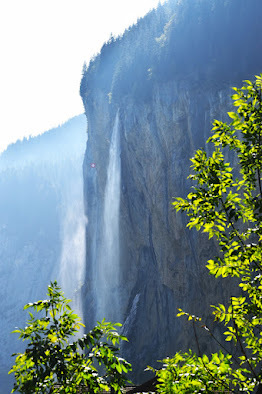
A short meditation:
Imagine yourself standing in this place. Breathe. Quiet. Breathe. Peaceful. Serene. Yet...
No only would you hear the waterfall crashing to earth, you would feel the misty and cool air. Smell the moisture and organic things churned up by the water. How the air seems to vibrate with energy. See water droplets clinging to leaves and maybe even your own skin.
Being in a place like this creates all kinds of feeling when we stop and listen.
Darlene Beck Jacobson finds inspiration is the quiet places around her.
February 11, 2024
Listen! Do You Hear Voices, Too?
When I’m writing dialogue, the hardest part is mastering individual voices. The nearly unachieveable goal is this: No matter who’s delivering a line, I want the reader to know who's speaking without a dialogue tag.
Every once in a while, I get lucky and distinctive voices flow from the air and through my brain, where my fingertips magically type out the words in such a way that you know who delivered that line.
Much more often, and often midway through a first draft, half the characters reveal their voices.
Then there's the third category, the remaining characters. That’s where the work—and especially, the listening—comes into play. Where do I find inspiration? Who and what do I listen to? I have three go-tos. And here are examples of each:
Old Man Golliwop from The Gollywhopper Games
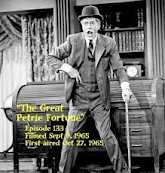
His voice came to me thanks to Dick Van Dyke; specifically, when in The Dick Van Dyke Show, he played Uncle Hezekiah. From that character, I heard Old Man Golliwop's voice. Not only that, Dick Van Dyke's portrayal also colored Old Man G’s movements and mannerisms.
Travis Raines, the main character in The Seventh Level.
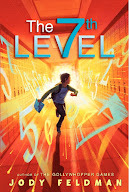
Why not borrow from someone you love especially when you’re pretty much the opposite of an ADHD diagnosis and, right there, is the person who embodies it? That's how I saw Travis.
Stav from my current WIP
 I had no clue who this character was or what he sounded like. I also had no clue if he even belonged in the story. But then I came across a picture of a cocky athlete, the embodiment of Stav. Now, for the voice. I tuned to videos of athletes and other celebrities who come across as, well, maybe a bit arrogant (I still want you to like Stav) but also self-assured.
I had no clue who this character was or what he sounded like. I also had no clue if he even belonged in the story. But then I came across a picture of a cocky athlete, the embodiment of Stav. Now, for the voice. I tuned to videos of athletes and other celebrities who come across as, well, maybe a bit arrogant (I still want you to like Stav) but also self-assured.Sometimes it's hard, but I keep myself from copying what these characters or people do and say. Instead, stopping, listening and absorbing their attitudes--taking inspiration from them--I hope to bring my characters’ voices alive.
***
Jody Feldman encourages you to stop and listen to the voices of the characters in books you read and movies you watch. Notice the subtle differences? Maybe the authors and screenwriters also took inspiration from listening.
February 8, 2024
LISTEN by Jane Kelley
So here I am. In the middle of Connecticut. At the Goodspeed Opera House. The place where ANNIE was first produced. And MAN OF LA MANCHA. Talk about dreaming the impossible dream to escape the hard-luck life. I'm one of the participants at the 2024 Johnny Mercer Foundation Writers Grove at Goodspeed Musicals.
How did this happen? I write novels for kids. By myself. At my kitchen table.
But here I am. The oldest writer here, certainly the one with the least experience in musical theater, writing a musical with my collaborators. Fortunately these guys know theater!

Greg Alexander writes, directs, and acts in plays and musicals at the B Street Theatre in Sacramento. Clifford Lee Johnson III ran the musical theater department at Manhattan Theatre Club before becoming an independent producer and writer.
And here I am. Gulp.
What do you do when you're surrounded by super talented people whose gorgeous music sweeps over you in a wave of feelings that carries you to an entirely new place.
What do you do when your collaborators tell you scene 7 doesn't move the show forward.
What do you do when the dramaturg has pointed insights about how to make your show better.
What do you do when your favorite joke doesn't fit the show anymore.
You listen. And get lifted and inspired and supported and tweaked and energized and nurtured.
And somehow your show gets better.
Jane Kelley is the writer of many middle-grade novels and one musical WIP entitled GRACE AND THE BUTTERFLY EFFECT.




